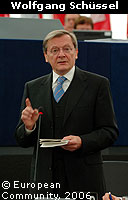Plenary Gas debate renews calls for common energy policy
The Austrian presidency of the EU hosted a plenary session at the Strasbourg parliament in on Tuesday 17, where several members renewed calls for a common energy policy in light of the recent spat between Russia and Ukraine, which affected gas supplies in Europe. However, there is still a clear divide over what role nuclear power could play in any common energy policy, and whether this or renewable sources of energy should be the focus of further research. The debate was added to the plenary session agenda due to concern over the reliability of Russian gas supplies. MEPs had convened their own unscheduled meeting on 11 January to discuss the problem, where the ensuing debate indicated broad agreement for a common energy policy. Austrian Chancellor Wolfgang Schüssel called on EU members to reduce their dependence on Russian gas and ensure security of supply. 'It's a question of reducing our dependence on one supplier and another question of diversification of supplies,' he said. Diversification of supply is generally agreed to be an essential long-term goal. The EU's Energy Commissioner, Andris Piebalgs went further, calling for a more 'Cohesive policy on security of energy supply [...]. This dispute has been a real wake-up call for the EU, we must learn the lessons from this and create a common foreign energy policy.' MEPs gave their renewed support to a common energy policy, but while some groups favour further investment in renewable sources, others envisage a nuclear future. Austrian Federal Minister for Economics and President of the Council Martin Bartenstein said that the EU needed to look to 'Clean technologies and long term use of parallel supplies. We don't think that nuclear energy is an option. We want to look at the development within the energy market and try to boost fruitful efforts.' However, Lithuanian MEP Danute Budreikaite called for the 'reanalysing of the return to a certain level of nuclear energy, in order to have a bigger independence from Russia'. Her compatriot Margarite Starkeviciute also favoured a nuclear approach, calling for the creation of a research/innovation centre for new generation nuclear power stations or similar technologies. 'I expect the Commission to come out with such a proposal; then our declarations on the Lisbon strategy would have real substance,' she said. In the medium-term, a pipeline bringing gas from the Caspian Sea via Turkey is on the drawing board, and will alleviate many of the current problems, but long-term solutions are less concretely visualised. MEPs cannot yet vote on whether to begin work on a common energy policy as a motion has not yet been tabled by either the Council or Commission.
Countries
Austria, Hungary, Italy, Lithuania, Russia, Türkiye, Ukraine

